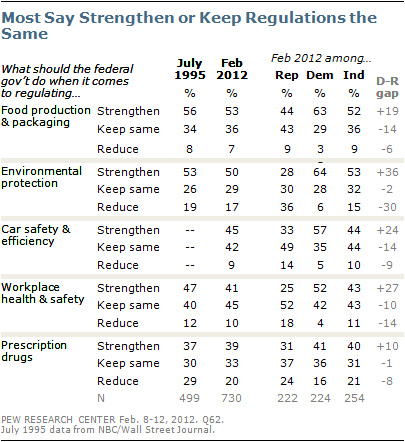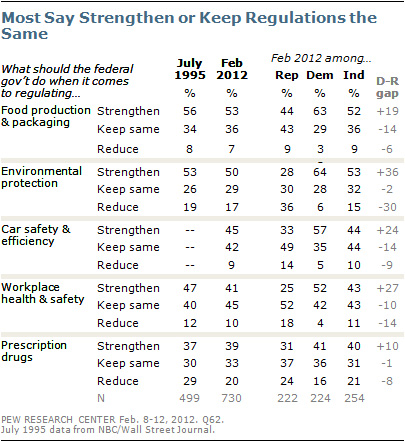It’s a well-known fact that Americans oppose government spending in the abstract yet favor virtually every government spending program. For example, last April Gallup reported that 73 percent of Americans blame the deficit on excessive spending and 48 percent wanted to reduce the deficit mainly through spending cuts (and 37 percent equally with spending cuts and tax increases). Only a few months before, however, Gallup also reported majorities opposed to cutting spending on anything—even “funding for the arts and sciences”—except foreign aid.* (This is not an isolated poll; see, for example, Washington Post-ABC News, April 2011, questions 14 and 17.)
Most government spending does go to popular programs like Social Security, Medicare, and Medicaid. I suspected, however, that most Americans would want to cut spending on federal regulatory agencies; I thought that they just overestimated the amount of spending on regulation, which is tiny compared to the large mandatory spending programs. (The Consumer Financial Protection Bureau, for example, last year put in a budget request of around $300 million—less than one-one-hundredth of a percent of total federal spending.)
It turns out I was wrong. According to a recent study by the Pew Research Center for the People & the Press (hat tip Harold Meyerson), a small majority (52-40) thinks that government regulation does more harm than good. When you look at every actual type of regulation, however, people wanting stronger regulations vastly outnumber people wanting reduced regulation, and there is little noticeable shift since 1995—another year of intense anti-government sentiment.

So, it turns out, Americans feel about the regulation the same way they feel about government as a whole: they don’t like the idea in the abstract, but they like it in concrete form. This shouldn’t be too surprising. Of course people want stronger food safety regulations when they read stories about people dying from tainted food; of course they want stronger environmental protections when they hear about toxic groundwater. At the same time, exactly half of the political establishment has been on a crusade to demonize regulation in general for the past forty years.
Now, you can’t really blame people too much for holding internally contradictory views about the government spending or about regulation; it’s not their job to understand where their money goes or what the government does. That’s one reason we wrote White House Burning chapter 4 is basically dedicated to trying to explain where our tax dollars go. Only with that kind of basic baseline understanding can we have any kind of sane discussion of fiscal policy.
* The foreign aid figure is also misleading, since Americans typically overestimate foreign aid spending by a factor of twenty-five.
Join us in defending the truth before it’s too late
The future of independent journalism is uncertain, and the consequences of losing it are too grave to ignore. To ensure Truthout remains safe, strong, and free, we need to raise $31,000 in the next 48 hours. Every dollar raised goes directly toward the costs of producing news you can trust.
Please give what you can — because by supporting us with a tax-deductible donation, you’re not just preserving a source of news, you’re helping to safeguard what’s left of our democracy.
